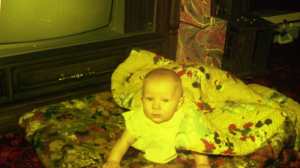Baby’s mom
When I was newly adopted, my parents introduced me to one of their employees named Neva (or something similar like Niva, Nova, Nevaeh, etc.) who had a few month-old baby whose picture is below.
Instead of calling her by her name, I called her “Baby Mommy” which would make everyone laugh or smile and say, “she’s so cute.”
If they had known about Korean culture, they would have known that it would have been very rude and even unthinkable for me to call an adult by her name; they would have known that “baby mommy” was not a child’s cute way, but a Korean way to call a mother of a baby.
“Baby mommy” was my way of translating directly the Korean expression 아기 엄마 (agi eomma) which means “baby’s mom” with the “s” ommited (as the 의 of 아기 의 엄마 is ommited).
“아기 엄마 ( Baby’s mom)”. That’s how Koreans call a baby’s mother. That’s how I called a baby’s mother while growing up in Korea.
If I had known Neva’s baby’s name, I may have called Neva “[the name of baby]’s mom”. But I didn’t retain the baby’s name, it was a too difficult name for a Korean girl to say or remember.
Unbeknownst to me I was recycled to an all American girl (and later to a Québécoise de souche) within a short time, I stopped callling Neva “baby mommy”and I started addressing her and other adults by their names.
“Someone’s mother; someone’s father”
In 2001, a Korean friend (who then lived in Montreal) invited me to go to Korea. At the last moment she learned I couldn’t stay at her parents’ house, so she found me a family to stay with during my trip in Korea to search my family. All I had to do, in exchange for my accomodation, was to speak in English or read an English book with a seven year-old girl, the only child of the family. Her sister, who was the private English teacher of the girl, needed to take vacations, so I would be like her substitute. I told her that my spoken English was aweful but she assured me that it didn’t matter to the mother of the girl.
Before meeting the family, my friend introduced me to her sister to talk about the child, Sue Young… “And what’s the name of the lady?” I asked at the end. A brief silence that followed made me feel like I had asked a wrong question. “You don’t need to know her name. Call her Sue-Young eomma, it means Sue-Young’s mom,” she said. While she was explaining me that’s how they do in Korea, I felt awkward and I felt like I wanted to scream, ” Why can’t I know the name of a person whom I’m going to live with for five weeks!!? How am I going to endure THIS for that long?!!!!” My whole body ached, but I kept quiet…
The language I don’t speak was once my mother tongue and the culture I find weird was once my culture. I don’t remember the language but I remember the culture. Yes, I REMEMBER the Korean culture as if I had learned it from a book or from white adoptive parents (except that I didn’t learn it from something or someone stranger to the culture, I had lived it naturally with my natural parents and my people; I didn’t know yet anything about the word “culture” yet I was part of the culture and the culture was a natural part of me). And everytime I think of my Korean life with my mind of Quebecer, my whole body hurts, it hurts so much I wish to die.
In Korea, parents are referred to as someone’s mother/mom or father/dad. For example, my teacher would address my father as 명숙(의) 아버지 which means “Myung-Sook’s father”; the teacher of my brother Dae-Yeol would address our mother as “Dae-Yeol’s mother”; My sister Marie’s friends would refer to our mother as “Marie’s mom”, etc.
Husband and wife may also call each other “[their child’s name]’s father” or “[their child’s name]’s mother”. For example, Sue-Young’s mom would call her husband, “Sue-Young appa” which means “Sue-Young’s dad”.
Myung-Sook’s father
As I remember this part of culture (referring parents to as someone’s mother/mom or someone’s father/dad), my heart aches for my father. When I lived in Suwon, my father was referred to solely as “Myung-Sook’s father” as all my siblings had left home. I can only imagine how it hurt him to be referred as “Myung-Sook’s father” by the neighbors after I was gone. I can only imagine how he suffered after losing me. I can only imagine how he felt every time he entered the empty house/room that was lent to us by our generous landlady. I can only imagine the overwhelming loneliness and grief that made him drink to death . [link] There was no other way for Myung-Sook’s father to escpape from such loneliness and grief after losing Myung-Sook (to the industry of adoption).
